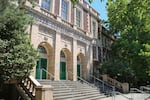Students at three Portland high schools endured hateful and racist incidents last school year.
The response from Portland Public Schools varied in each case. Administrators held a cultural fair at one school. They hosted a restorative justice circle at another. At a third school, it canceled security contracts.
Some students and parents say it’s inconsistent and not enough.
What Happened And How PPS Responded
Earlier this year, students of color at Wilson High School in southwest Portland felt unsupported and unsafe, following incidents of students calling other students the N-word.
In May, they wrote a letter and walked out of class.
“There was just no stability and we were just sick of it and we just wanted to see some change,” said 15-year-old student Aslan Newson. “So we took it into our own hands.”

Aslan Newson leans against a bannister at Wilson High School in Portland, Ore., Thursday, July 25, 2019. Earlier this year, a coalition of students of color at Wilson wrote a letter to school administration and walked out of class following racist incidents at their school.
Celina Tebor / OPB
Newson is part of Wilson’s Black Student Union. The school’s Asian Pacific Islander Club and Muslim Student Association contributed to the letter, too.
The letter outlined four issues students of color at Wilson said they faced. But at its core, the letter had one main point: Wilson students of color felt the administration wasn’t watching out for them.
“We don’t feel safe in a place where everywhere we go we are a minority, facing hate and ignorance at every corner, with only a select group of teachers to support us,” reads the letter.
After the letter and walkout, Newson said she felt more supported by her white peers. Wilson’s cultural affinity clubs met Wilson’s incoming principal and district staff. Teachers started discussion groups.
“Anyone can come, whether you're a person of color or you're white and you just sit and you learn and you listen to people and their stories,” Newson said.
Newson believes the students’ actions had a positive impact, but it was a last resort.
“We wouldn’t have had to have our walkout or do the things we did toward the end of the year if our administration was doing things in the first place,” Newson said.
Related: Hateful But Not A Hate Crime
Wilson isn’t the only high school to deal with racist or hateful incidents last year. In May, contracted security got physical with students of color at Franklin High School, handcuffing one student.
And several incidents took place at another Southeast Portland high school — Cleveland High: There were anti-Semitic graffiti, reports of a noose hanging in the school, and students baking a cake that resembled blackface.
To PPS Superintendent Guadalupe Guerrero, they reflect a rise in hate incidents nationally.
“There are definitely teachable moments for us around needing to double down on the dialogue that we have in our school communities both among students and educators and school leaders,” Guerrero said.
Guerrero and his team say equity is a top priority for every staff member. The district analyzes all new programs with what it calls an "equity lens."
And in the district's new vision detailing the ideal qualities of a PPS graduate, there are several references to students as racial equity leaders.
But in practice, it’s hard to tell what the district has put in place.
District Decisions
At PPS, Dani Ledezma is the only staff member with equity in her title. She’s the district’s racial equity and social justice advisor. With Guerrero’s reorganizing of the district, Ledezma said the goal is for everyone to play a role in equity work.
That work is ongoing.
A racial equity plan for the district is behind schedule. Ledezma said its completion hinges on the completion of a bigger effort — the district's strategic plan — which should be done by November.
The district will also work on expanding contracts with nonprofits that work with specific communities of color on attendance, school culture and parent engagement.
“We're thinking about how we can build the capacity of our school leaders, our school staff to be able to facilitate these types of conversations so that students feel welcome,” Ledezma said.
Schools with highly diverse populations receive these culturally-specific services. But as two of Portland's least diverse high schools, Wilson and Cleveland are not official sites for this programming.

Grover Cleveland High School is pictured in Portland, Ore., Thursday, July 25, 2019. The school saw anti-Semitic graffiti, reports of a noose hanging in the school, and students baking a cake that resembled blackface this pas year.
Elizabeth Miller / OPB
Guerrero said he would like to use funds from the state's new school funding bill to address racial equity issues.
Ledezma would also like to see more schools incorporate student-led efforts. She cited Grant High School's Race Forward conversations as an example.
“We’re really interested in thinking how we can support this type of work,” Ledezma said. “It will probably look different at each school.”
But Cleveland High School parent Mark Takiguchi warned PPS not to put too much of the work on students.
“I worry sometimes that institutions tend to put a lot of the responsibility onto the people that are most affected by these incidents rather than trying to work with them,” Takiguchi said. “But to take the responsibility to actually make the fixes themselves.”
Related: Workshop Helps Portland High School Students Tackle Tough Topics
Ledezma said the district could improve when it comes to supporting students on and off campus. She said the district is working on equity-focused teacher training for next year, too.
But the district has not had any type of systemwide equity program in at least two years. That was the last time PPS had a license for Courageous Conversations, a program to help staff talk about race.
“I think as a system, we’re trying to figure out where we are on the learning curve and what are multiple ways we can deliver this type of learning,” Ledezma said.
Takiguchi expected the district to have something in place by now.
“It wasn’t replaced with anything,” Takiguchi said. “To imagine that the kind of daily microaggressions and challenges that every urban school faces would not be an important issue to address is puzzling.”
Parent And Student Solutions
Takiguchi and another parent met with Cleveland’s then-principal Ayesha Freeman after the initial hate incidents. They talked about what to do next.
Even after Freeman resigned, the group continued to meet as an equity council. The group ended the year with two major goals.
“One was to address at the district level a clarification of its policy and to advocate for very specific programs to kick into place when these incidents arise,” said Cleveland High School parent Catherine Greenblatt.
Greenblatt plans to ask the PPS Board of Education members to clarify district policy on hate speech once the school year begins.
The other major goal is to bring a more diverse curriculum to Cleveland, with film screenings and discussion groups based around race. It’s an idea Wilson student Aslan Newson is interested in, too.
“Racial equity, inequality needs to be taught in every single classroom, not just during Black History Month for an hour,” Newson said.
In addition, parents want district administration officials to start tracking hate incidents to measure progress and to support teachers and staff when they talk about race.
“It's not as if the champions of this kind of work don't exist,” Takiguchi said. “They just need to be supported and they need to have a system where they can be more successful.”

Cleveland High School parent Mark Takiguchi in Portland, Ore., Tuesday, July 9, 2019. Takiguchi argues institutions like school districts put too much responsibility on students of color to solve race equity issues "rather than trying to work with them," he said.
Elizabeth Miller / OPB
At Wilson, parents have expressed interest in an Anti-Defamation League program called No Place for Hate. They reached out to Tigard High School, where a No Place for Hate program recently started. The program is at a couple of other schools in the Tigard-Tualatin School District and there is interest from district leadership in expanding the program.
As with PPS and other school districts, Tigard-Tualatin is working on a way to curb hate speech and make sure all students feel safe at school.
In the next couple of months, the Tigard-Tualatin school board will start working on a hate speech policy, and throughout the next year, district equity coordinator Zinnia Un will begin identifying teachers who can lead equity work at the school level.
“A lot of this work is not done just by a group of leaders sitting together, but it’s sitting within the community,” Un said.
For Un, the focus is not just on people of color, but on the district community as a whole.
“If we don’t talk about those that either unintentionally contribute to that or folks that don’t fully understand the different inequities that people experience, then we don’t include them in that picture,” Un said. “We’re not really having a dialogue.”
But talking about race and equity is sensitive for some. And allowing community members to speak openly might mean that change happens behind closed doors.
After being invited to one of the Cleveland equity council meetings, I was asked to leave. As a journalist, a group member raised a concern about my witnessing the meeting and writing about it.
New Year, New Leadership
Both Wilson and Cleveland high schools will start the school year with new principals. Former Roosevelt High School Principal Filip Hristic will lead Wilson. He replaces interim principal Maude Lamont, who resigned amid concerns from students and staff.
Cleveland’s new leader is Leo Lawyer, who most recently served as Neah-Kah-Nie Middle School principal.
At Wilson, former Cleveland principal Ayesha Freeman will serve as vice principal. She resigned after a vote of no confidence from staff.
At least some of the concerns expressed about the departing school leaders relate to how they responded to racist incidents on campus.
At the district level, Ledezma said the district will be sharing its teacher training plans to school leaders at a workshop next month.
Parent Catherine Greenblatt sees these incidents as a chance to examine the PPS curriculum and make sure students are given the tools they need to be respectful citizens.
“What we’re seeing in these responses and in these incidents is that we’re not succeeding,” Greenblatt said. “So it is an opportunity to rethink all of that in an exciting way.”

Cleveland High School parent Catherine Greenblatt at her home in Portland, Ore., Tuesday, July 9, 2019. Greenblatt sees recent incidents of hate as a chance for Portland Public Schools to examine and retool its curriculum.
Elizabeth Miller / OPB
Wilson student Aslan Newson is heading into her sophomore year feeling more optimistic. She’s talked to Hristic and thinks he’ll be a good addition to Wilson.
“He seems very open and just willing to make change happen,” Newson said.
The broader community around Wilson will be watching Hristic, too. The Hillsdale Neighborhood Association board recently passed a resolution to send Hristic a message, asking for transparency when it comes to information about hate incidents at Wilson.
In the upcoming school year, Newson will be president of the Black Student Union at Wilson. She wants to spend time this year connecting with other BSUs. And she wants to reach out to future Wilson students to tell them they have a safe space in the school’s cultural affinity clubs.
She’s willing to keep working on these issues. But she wants the administration to work on them too.
“You go to school to learn, not to have to form a walkout and a protest against your own administration,” Newson said.